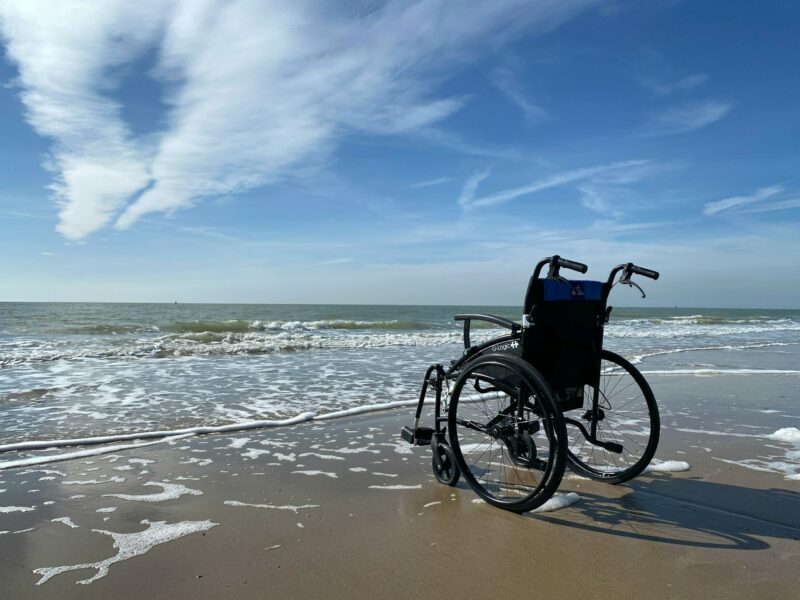Accessible holiday rentals tailored for people with reduced mobility
Barrier-free properties, suitable for everyone

- Key features in adapted holiday rentals.
- Adapted outdoor access.
- Assistive technology.
- Inclusive services and personalised attention.
- Holidays without limitations.

February 2024
In today’s dynamic landscape, accessible tourism must emerge within the sector as an essential element to consider for both owners and managers. We should aspire not only to provide the best accommodation and service but also to ensure that this accommodation is suitable for everyone.
In this article, you’ll discover the advantages and challenges of participating in this growing trend. We’ll provide you with the keys to optimally adapt your place and effectively promote it. Learn about the specific features that make your property accessible and how to communicate them accurately.
But beyond finding support to help transform your holiday rental into a space for everyone, you’ll also discover an ideal platform to showcase your inclusive and welcoming property in the competitive world of holiday rentals. Join the transformation and make your property part of the evolution towards truly inclusive tourism!
Key features in adapted holiday rentals
Exploring the necessary features for renting homes adapted to people with reduced mobility is essential to ensure accessibility and enhance the guest experience. Below, find out which elements are indispensable in an adapted holiday rental:
Barrier-free exterior access:
An accessible holiday rental starts with well-adapted exteriors, ideally suited to ensure good access to the property and its surroundings. Some examples include:
- Houses adapted for people with reduced mobility often implement effective solutions such as ramps, strategically designed to ensure a smooth and safe transition from the exterior to the interior of the holiday rental.
- Some holiday rentals commonly incorporate lifts or platform lifts, providing alternatives that ensure accessibility at different levels of the property. It’s important to provide evidence of these facilities through photos or testimonials in the published listing.
Wide doors and hallways:
The presence of wider-than-usual doors and hallways is essential to guarantee easy and comfortable movement, especially for wheelchair users and those with vision problems. This feature is also advisable in case a guest needs assistance from another person.
Kitchen:
In case your holiday rental has an adapted kitchen, as a host, it’s essential to provide accurate and detailed information. Here are some key aspects to highlight and offer transparency to potential guests:
- Provide clear and detailed information in your listings about the height of the kitchen countertops.
- Highlight the strategic arrangement of appliances to facilitate access and offer real photographs when advertising your holiday home, showing the location of appliances.
- Inform guests about the measures you have taken to comply with local regulations and recognized accessibility standards at both national and international levels.
- Provide details on how the adaptation of your kitchen follows regulations to ensure an inclusive experience.
Bathrooms:
Bathrooms are a crucial space when deciding to adapt accommodation; therefore, the following elements are vital considerations:
- Support bars: a fundamental component of adapted bathrooms, ideally installed inside showers or next to toilets.
- Floor-level showers: a significant feature for people with reduced mobility, as it allows uncomplicated access to the shower.
- Mobility: it’s important that the space is large enough to allow mobility around sinks, toilets, and showers.
A crucial aspect to consider during bathroom adaptation is wheelchairs, as they are likely the most complex element interacting with the new installation. Therefore, as hosts, we must always undertake remodelling with an expert and in accordance with current laws.
Assistive Technology:
- Accessible remote controls: a feature that ensures easy control by people with reduced mobility for elements such as lighting, blinds, or air conditioning.
- Smart lighting systems: systems easily controlled by voice and from mobile devices, eliminating the need to interact with switches.
- Voice devices: a technology newly introduced to the market, but it can be very helpful in transforming accommodation into a smart home. Thus, guests can control the status of the accommodation with just their voice.
Effective incorporation of assistive technology can transform the accommodation experience for people with reduced mobility, providing autonomy and comfort. Therefore, it is highly recommended to consider it to make your property more appealing online.
Inclusive services and personalised attention:
Personalised attention combined with an offering of inclusive services are key elements to improve the guest experience from booking to check-out.
- Clear communication on accessibility: listings should provide clear descriptions of accessibility, services, and amenities.
- Personalised information: hosts highlighting these services in their listings should support these claims with specific examples, images, and testimonials.
- Adaptations to specific requests: from providing extra pillows, specific toiletries, or adjustments to the layout of both rooms and bathrooms.
- Continuous assistance: personalised attention and inclusive services are areas in constant evolution. Constant feedback can improve and exceed guest expectations.
Adapting holiday rentals to meet the specific needs of travellers with disabilities is a key approach for hosts committed to inclusivity. We suggest that listings should provide clear details about the adaptations made, including information about ramps, lifts, adapted bathrooms, and other accessible features.
Flexible policies and service customisation:
Hosts adapting to specific needs often have flexible policies but must be committed to complying with local accessibility regulations, which can be viewed in the details provided in the same listings.